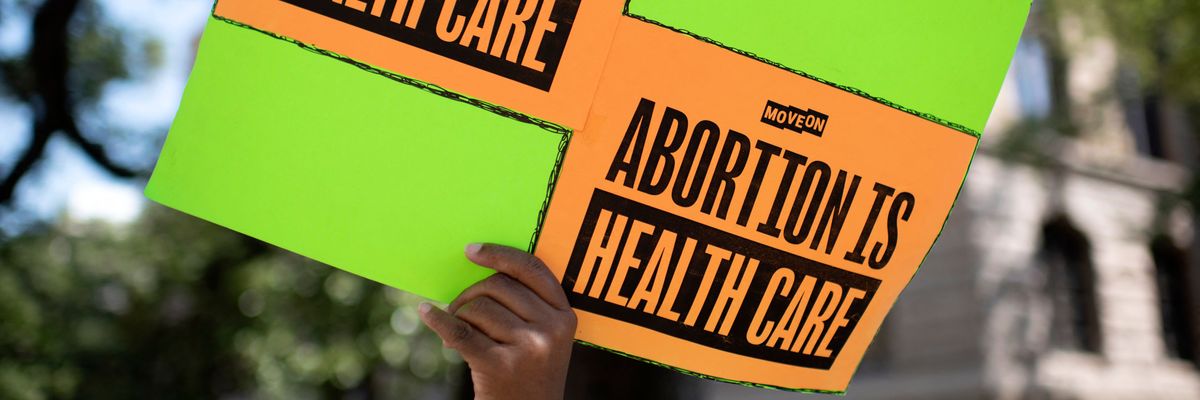Reproductive justice groups on Friday night said the Texas Supreme Court and Republican Attorney General Ken Paxton were "directly endangering" a pregnant women who recently received news that her fetus has a life-threatening condition, after the high court halted a judge's order permitting the woman to obtain abortion care.
The state Supreme Court issued a stay temporarily blocking Travis County Judge Maya Guerra Gamble's Thursday ruling. Gamble had issued a temporary restraining order, allowing Dallas resident Kate Cox to obtain an abortion and protecting her physician, Dr. Damla Karsan, from civil or criminal liability under Texas' near-total ban on abortions.
Paxton quickly appealed Gamble's ruling, telling the court, "Nothing can restore the unborn child's life that will be lost as a result."
Molly Duane, senior staff attorney for the Center for Reproductive Rights (CRR), which is representing Cox, said Friday night that the group is holding out hope that "the [state Supreme Court] ultimately rejects the state's request and does so quickly."
"In this case we fear that justice delayed will be justice denied," said Duane. "We are talking about urgent medical care... This is why people should not need to beg for healthcare in a court of law."
Cox, who is about 20 weeks pregnant, discovered last week that her fetus has abnormalities including trisomy 18, a condition that would result in a miscarriage, stillbirth, or the death of her baby in the hours or days after birth.
Cox has sought emergency medical care several times since finding out the diagnosis, reporting symptoms such as cramping and fluid loss to emergency room doctors—but while Texas' abortion bans claim to allow exceptions in cases where a pregnant person's life or health are at risk, many health professionals are unwilling to risk potential life imprisonment by providing care.
Karsan has advised Cox that continuing the pregnancy could put her health and fertility at risk. Under Texas' abortion bans, Cox's only options are to have a Caesarean section after carrying the pregnancy to term—even as her health grows worse—or to have labor induced in the case of the fetal heartbeat stopping. Due to previous C-sections, doctors have told Cox that she could experience a uterine rupture if she is forced to give birth to the baby.
On PBS Newshour on Friday, Cox described how her baby "would need to be placed directly onto hospice" care if she is forced to go through childbirth.
Paxton and the state Supreme Court, which consists entirely of Republican judges, are "100% committed to torturing" Cox, said Slate journalist Mark Joseph Stern.
By challenging Gamble's ruling, CRR said in court filings that the state demonstrated "stunning... disregard for Ms. Cox's life, fertility, and the rule of law."
Before appealing Gamble's decision, Paxton wrote a letter to three hospitals where Karsan has admitting privileges, warning that if she provides abortion care to Cox there they could face civil or criminal penalties regardless of the lower court ruling. The attorney general said Gamble was "not medically qualified to make this determination."
The letter was the state's attempt to "intimidate [Karsan] to not act," Dr. Judy Levison, another obstetrician-gynecologist in Houston, toldThe New York Times.
"They named her and so, it's intimidating," Levison said.
On Thursday, Duane refused to comment in a news briefing about whether Cox and her doctors were planning to move forward with the abortion and when or where she might obtain care.
Cox is reportedly the first pregnant patient to request an emergency abortion from a court since the U.S. Supreme Court overturned Roe v. Wade last year.
On Friday, the day after Gamble ruled, a pregnant woman in Kentucky sued the state, saying its abortion ban violates residents' constitutional right to privacy and self-determination.
Mary Ziegler, a law professor at the University of California at Davis who specializes in abortion, told The Washington Post that Paxton likely "wants to stop Cox from being an example" for other pregnant people who need or want to terminate their pregnancies.
"Courts are arguing with each other about whether a woman can have a medically necessary abortion while she continues to remain pregnant with an unviable pregnancy," said activist Olivia Julianna. "This is not a hypothetical nightmare—it is a living one."
